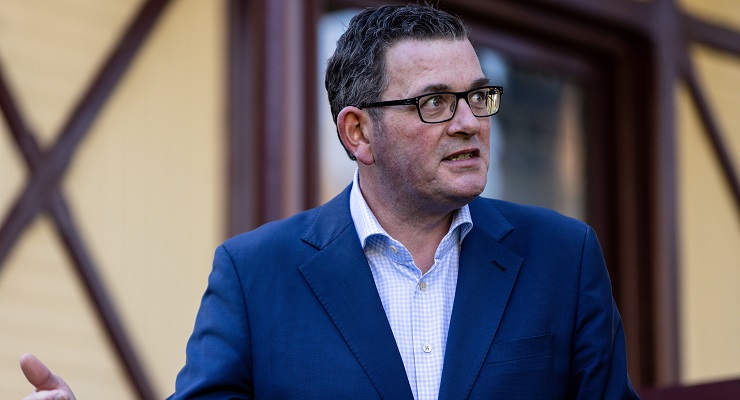
This is part one in an explainer series about the important issues in the Victorian election.
Whether state or federal, every election tells a story.
In Victoria 2010 the story was — according to received wisdom — one of a Liberal-National coalition so used to the opposition benches that its narrow win caught even the incoming premier by surprise. Four years later, it was the reckoning inspired by that lack of preparedness for government that had the Liberal-Nationals making history as the first one-term government in the state for nearly 60 years.
In 2018 it was the Danslide, when the gravitational pull of traditional bread-and-butter issues threw Victorians’ disdain for law-and-order, fear-based politics into sharp relief (African gangs, anyone?) and, in the process, delivered Andrews a thumping victory. And notwithstanding rumours of a tightening race, the prevailing consensus is that the Andrews government is most likely to walk it in on November 26.
Intuitively, the story of this election might therefore lie in voter recognition of Daniel Andrews’ achievements or commitments across infrastructure, social reform (think family violence, mental health, assisted dying) and progress on Indigenous reconciliation.
But to anyone with a nodding familiarity of the legion of (current) transparency and corruption probes into the government — its exodus of senior ministers, the attacks on environmental activists, spiralling debt, not to mention a health system on its knees and the lack of infrastructure in growth corridors — that is not the story.
To help make sense of all this, from now until election day, Crikey will unpack the key issues confronting the election, beginning today with integrity and transparency.
The big picture on integrity in Victoria
In a shift from the last election, integrity and accountability in government are firmly on the ballot papers of many voters, who — unprompted — have consistently ranked it as one of the most important issues in the election.
Analysts say this is probably unsurprising, given the incomparable deftness with which the former Morrison government gave voters a crash course on the importance of convention and transparency in a functioning liberal democracy.
But it’s also front of mind because of the slew of embarrassing investigations into the Labor government by IBAC — the state’s corruption watchdog — and the Victorian ombudsman.
These extend to rampant branch stacking, allegedly corrupt property dealings in Melbourne’s outer suburbs, the government’s relationship with the United Firefighters’ Union and — as emerged last week — Andrews’ apparent involvement in awarding two grants worth millions of dollars to the Health Workers’ Union on the eve of the last election.
Add to this the misuse of public funds in the red shirts scandal, independent calls to urgently reform the state’s freedom of information system and separate probes into the politicisation of the public service under Andrews by the ombudsman and the public service commissioner.
The premier has, as a matter of public record, been interviewed by IBAC no fewer than four times. There well could be other investigations on foot, but we simply don’t know about them courtesy of the singular inability of the watchdog to conduct public hearings absent “exceptional circumstances”.
The opposition, meanwhile, is weighed down by its own corruption issues, having been referred by VEC to IBAC over the $100,000 donor scandal, and, separately, Matthew Guy’s infamous lobster scandal.
And therein lies voter angst about potential corruption and lack of integrity in Victoria. Compounding this, recent debate on the proposed federal anti-corruption bill has sheeted home to Victorians the marked limitations of their watchdog, which extends to its constrained jurisdiction to investigate soft corruption, including pork-barrelling.
Why it matters: while the opposition is unlikely to carve any particular advantage out of this state of affairs, it could spell trouble for the government elsewhere.
In several seats and in the upper house, independents, teals and minor parties are running hard on integrity, seemingly buoyed by the results delivered at the federal election. Given the preference system in Victoria, anything could happen.
What’s on the table: the opposition has advanced a wide range of integrity reforms, including openness to calls to make funding of accountability bodies independent of government. (See, however, disclaimer above.) The Andrews government, meanwhile, has not responded to that call, and has indicated little willingness to move beyond its recent (and generally well received) reforms to donations laws.
The bottom line: it’s not beyond the realms of possibility that the result might be one of voter pushback against what Princeton University Professor Kim Lane Scheppele calls “democratic erosion by law”: the weakening of liberal democracy from within via measures that, for instance, limit the power of oversight bodies and checks on executive power. Crikey‘s tip: keep an eye on the teals and progressive independents.
Next up: climate change – are the major parties promising enough? See here for part two of our election explainer series.








This Labor government are environmental vandals, the SEC is a great idea, the LNP are a shambles, vote whispering could unseat one of the best small parties we have seen in years.
There is no point making predictions but surely both major parties will lose seats and the preference distribution will anoint some less than useful new pollies, if the new good ones have to work with a minority government then the push is on and we’ll be better off.
Just a day after this article on Victorian corruption , The New Daily reports
The commission gave up on its own investigation because
The bigger picture.
Labor – promised to fix train crossings, way back when.
Coalition – Make the public suffer, we don’t care.
Labor – Dan said Crown wouldn’t lose it’s license if a royal commission was held
Coalition – nothing
Labor – Dan say Universities are now pseudo employment agencies
Coalition- nothing
Labor – Dan says a Ponzi construction is good for the building industry (stuff the public)
Coalition – nothing
Labor – Dan says Melbourne will have 11 million soon (stuff the public)
Coalition – nothing
Labor – a massive population expansion is the furture (stuff the public)
Coalition – nothing
Labor – our ideal of massive overpopulation will be fixed with $120B of train lines (stuff the public)
Coalition – nothing
Labor – Lets bring back the SEC
Coalition – Jeff, please help here
etc……….
I remember the good old days of dictator Henry Bolte who ended up being replaced by Rupert Hamer – the Turnbull equivalent.
Ruper Murdoch’s love of dictators is highly selective these days. Perhaps Dan isn’t ‘flexible’ enough.
Rupert Hamer was a far more effective and reasonable politician than Turnbull who was the best of a really destructive bunch and era , I don’t think a comparison is fair.
The single biggest issue for Labor is not corruption, because right now in the public mind the Liberals are streets ahead in that field. Areas where Labor excels, such as branch stacking have also been exposed in Liberal ranks. Even though the Libs are rank amateurs at the art of the stack compared to the ALP the mere presence of of stacking stories among the Libs in the media negates the issue.
As for dodgy deals with unions, well in the Libs we have dodgy deals with business. Most people see this back scratching of fellow political travellers as par for the course. We all know that Labor is affiliated with unions, just like the LNP is affiliated with business. So again people just shrug and move on. It’s also probably message fatigue, the right wing press and the LNP have been demonising unions for so long, without any real evidence of widespread wickidness that it appears to have lost it’s impact. Sure a handful of union leaders are thugs, but at the same time the media keep showing us that a handful of business leaders are crooks, and once again the stories balance each other out.
No the real risk for the ALP is that the Teals will gain a significant foothold. Once that happens the eventual disintegration of the Liberals is assured and a new party comprised of members of the current moderate wing of the LNP and the Teal will emerge. That will present a real threat to Labor.
So not in 2022. Maybe in 2026. Probably by 2030.
The Media fascination, (now including Crikey), with IBAC Investigations is rather disingenuous.
IBAC is doing exactly what it is supposed to do – Investigate, and then provide Reports, some of which may lead to Prosecutions for Law Breaking.
The thing is though, that regardless of how many times Daniel Andrews or others have been questioned or investigated, so far, there has been a limited amount of adverse findings and prosecutions, and certainly nothing of any substance relating to Daniel Andrews.
Merely being Investigated and/or questioned by IBAC does not automatically mean someone is corrupt.
Whatever happened to the Presumption of Innocence until Proven Guilty?